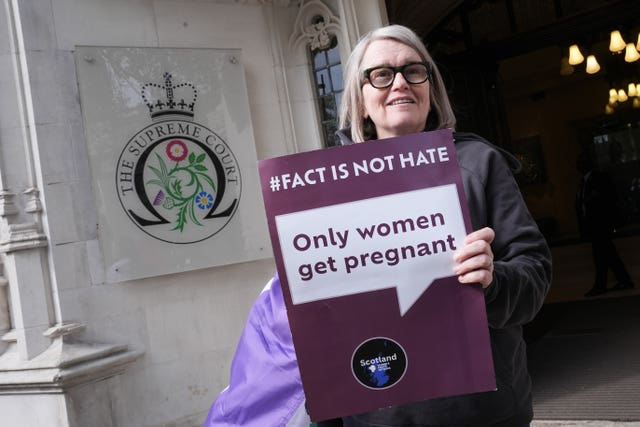Campaigners take step in legal action over toilet guidance after gender ruling
Good Law Project said on Friday that it had sent a pre-action letter to the Equality and Human Rights Commission over its guidance.

A campaign group and three individuals have taken the first step of a legal challenge against the equalities watchdog over its interim guidance related to trans people’s use of toilets, following the Supreme Court’s ruling on the legal definition of a woman.
Good Law Project (GLP) said on Friday that it had sent a pre-action letter to the Equality and Human Rights Commission (EHRC) over the guidance, which it said “authorises and approves unlawful discrimination”.
GLP and the individuals – two of whom are trans and one of whom is intersex – have also sent the letter to the women and equalities minister, Bridget Phillipson, and said that they had asked for a response within seven days.
It follows the Supreme Court ruling in April that said the words “woman” and “sex” in the Equality Act 2010 refer to a biological woman and biological sex, following a challenge against the Scottish Government by campaign group For Women Scotland.
The EHRC issued interim guidance following the judgment that said trans women “should not be permitted to use the women’s facilities” in workplaces or public-facing services like shops and hospitals, with the same applying for trans men using men’s toilets.
But GLP said on Friday that the guidance is “wrong in law” and the definition of gender in the Equality Act 2010 “does not read across” to legislation governing use of toilets, to which “the normal legal meaning of those words, which include lived gender, continues to apply”.
Jolyon Maugham KC, the founder and executive director of GLP, said: “The stark and needlessly cruel position adopted by the Government and the EHRC humiliates trans people by forcing them to use the wrong toilets and obliges them to reveal deeply personal information about their gender to complete strangers just to take a wee.
“It is deeply unkind, far removed from the national mood of mutual respect and live and let live, and is unlawful to boot.”

GLP also said that if the EHRC guidance is correct in law, it breaches the UK’s obligations under the Human Rights Act 1998.
The commission said it issued its interim guidance last month as “many people have questions about the judgment and what it means for them”.
But it also said that trans people “should not be put in a position where there are no facilities for them to use”.
It added that it would undertake a public consultation on how the judgment should be reflected in a more detailed code of conduct, which it aimed to finalise for ministerial approval by June.
In the pre-action letter, GLP said that the claim related to the guidance “purporting to set out, inter alia, that employers and providers of services which are open to the public are legally required to prohibit trans people from using the toilets in their acquired gender”.
It continued that it believed that the guidance “evidently represents what the commission regards as the indisputable legal consequences” of the judgment, and that the impact of the guidance “should not be underestimated”.
It said: “This proposed challenge is not to an ‘interim’ position, but guidance on an interpretation of the law which the commission has made clear is not up for discussion in the forthcoming consultation.
“The notion that the judgment puts beyond debate that trans women must be excluded from women’s toilets in workplaces and services open to the public and trans men must be excluded from men’s toilets is an extraordinary – and legally erroneous – position to have taken.
“The claimants will be challenging that guidance on the basis that it is irrational and/or wrong in law.”
A Government spokesperson said: “We do not comment on ongoing legal proceedings.
“The UK Supreme Court has ruled on the For Women for Scotland case with a unanimous opinion.
“We will consider the updated draft code of practice from the EHRC once it has been submitted and, importantly, engage with them to ensure it provides the certainty and clarity service providers and businesses need, in line with the Supreme Court ruling.”
A spokesperson for the EHRC said: “We are unable to comment on any threat of legal action at this stage.”





